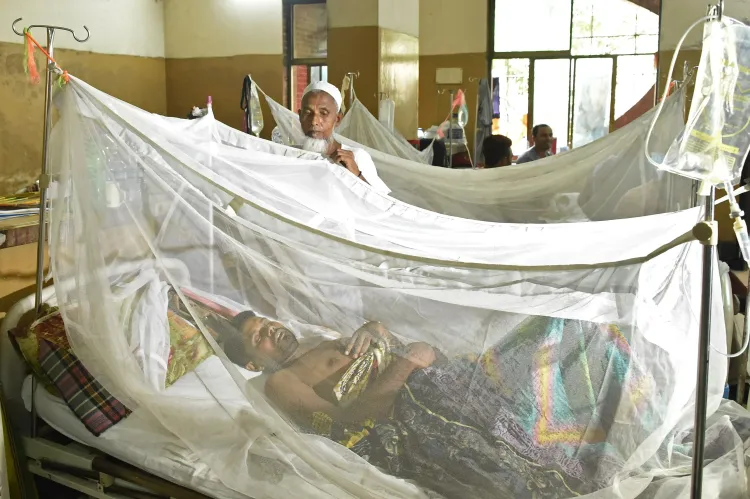What’s Happening in Bangladesh? Six More Die from Dengue, Death Toll Reaches 269 in 2025

Synopsis
Key Takeaways
- Six new dengue-related fatalities reported in 24 hours.
- Total dengue deaths in Bangladesh reach 269 in 2025.
- 983 new hospital admissions for viral fever in the same period.
- Over 50% of deaths occur on the first day of hospital admission.
- Emphasis on preventive measures to combat mosquito breeding.
Dhaka, Oct 27 (NationPress) In the last 24 hours leading up to Monday morning, six individuals lost their lives due to dengue in Bangladesh, bringing the total number of deaths from this mosquito-borne illness to 269 in 2025.
During this timeframe, 983 patients were hospitalized with viral fever, which escalates the total cases in Bangladesh to 66,423 in 2025. Reports indicate that four new fatalities occurred in Dhaka North City Corporation (DNCC), with one each in Dhaka South City Corporation and Barishal Division, as per the United News of Bangladesh (UNB).
Currently, 993 patients are being treated in Dhaka, while 2,740 patients are receiving care across various hospitals in Bangladesh. Among this year's dengue patients, 61.8% were male and 38.2% were female, according to reports. Of the total dengue-related deaths, 53.2% were men and 46.8% were women.
It is noteworthy that 575 people died from dengue in 2024.
On October 9, Director General of the Directorate General of Health Services (DGHS), Abu Jafor, pointed out that dengue cases in 2025 have surpassed last year's figures; however, the mortality rate is lower.
While addressing a press briefing regarding the ‘Typhoid Vaccination Campaign-2025’ at the Health Ministry, Abu Jafor stated: "This year has seen an increase in dengue infections compared to last year, yet the death rate relative to the infections is lower," as reported by United News of Bangladesh.
He emphasized the significance of controlling mosquito breeding and eliminating their larvae to prevent dengue. "People should utilize mosquito nets and adopt protective measures. This responsibility largely falls on individuals. Neglecting these measures will make it very challenging to eradicate dengue," he stated.
Jafor also mentioned, "Our statistics reveal that over 50% of dengue fatalities in hospitals occur on the first day of admission, indicating that patients are seeking care too late. We are striving to provide effective management in hospitals."
He highlighted the importance of early diagnosis, noting that if dengue is identified in its initial stages, it can be treated at home with appropriate medical attention. He cited a lack of awareness, negligence, and delays in seeking medical help as primary factors contributing to the rising dengue death toll.
Dengue is a viral infection caused by the dengue virus (DENV), transmitted to humans through the bites of infected mosquitoes. This disease is prevalent in tropical and subtropical regions worldwide, particularly in urban and semi-urban locales, as stated by the World Health Organization (WHO). Effective prevention and control of dengue rely on vector management. Although there is no specific cure for dengue, early detection and access to adequate medical care significantly reduce the mortality rates associated with severe dengue.









